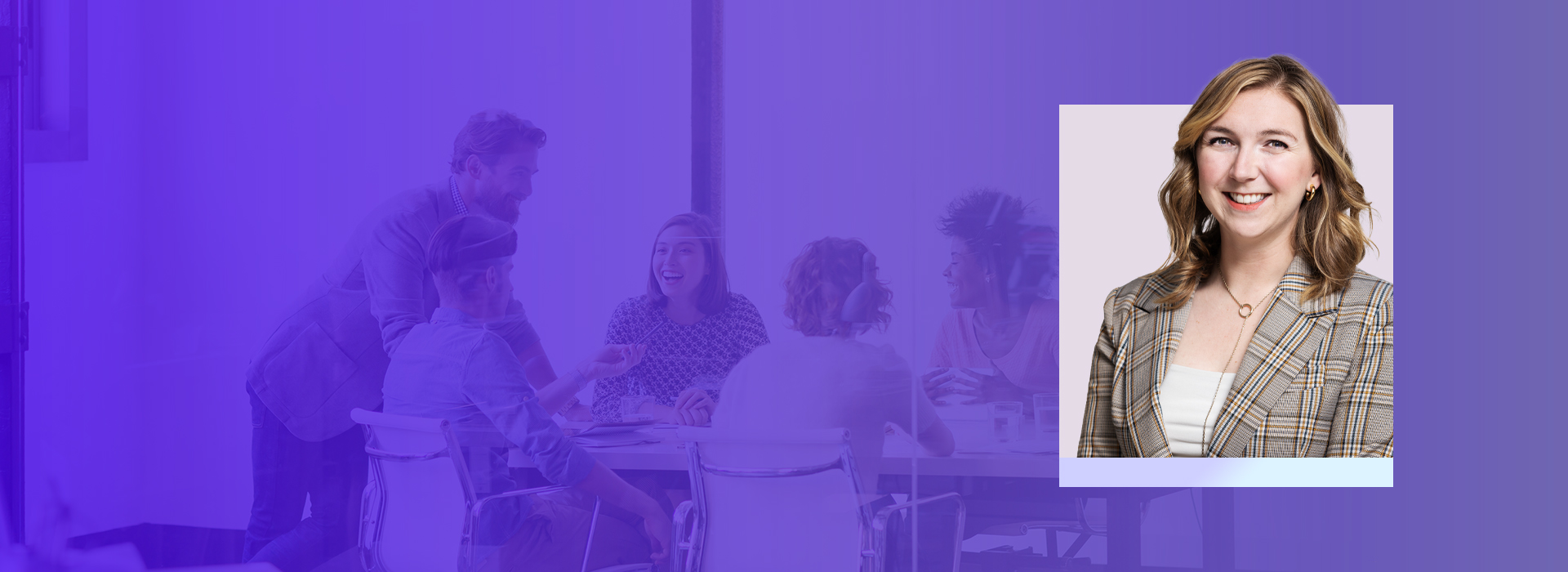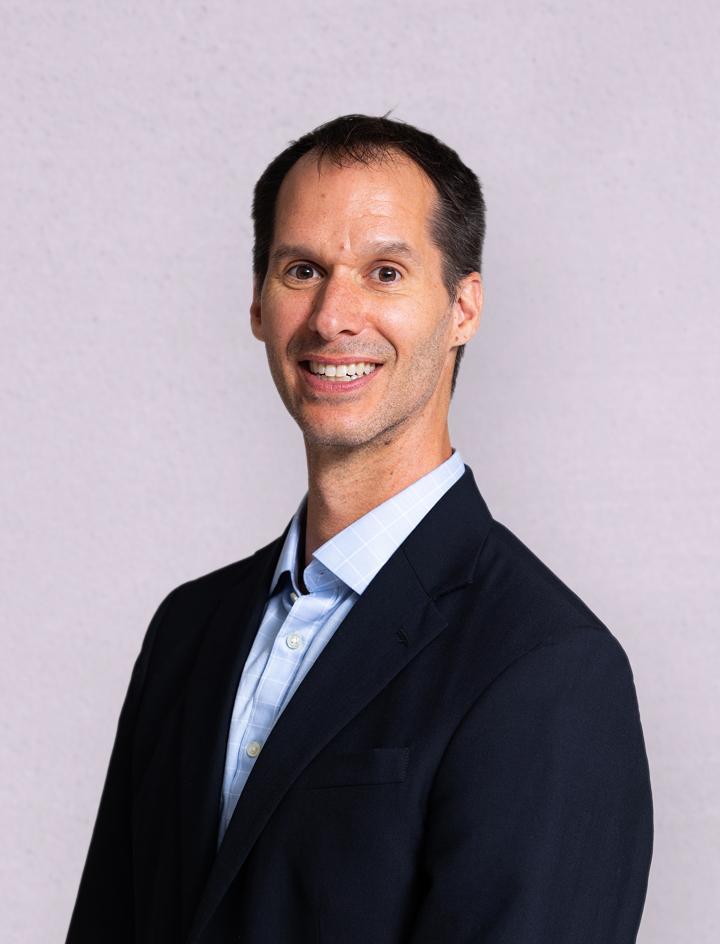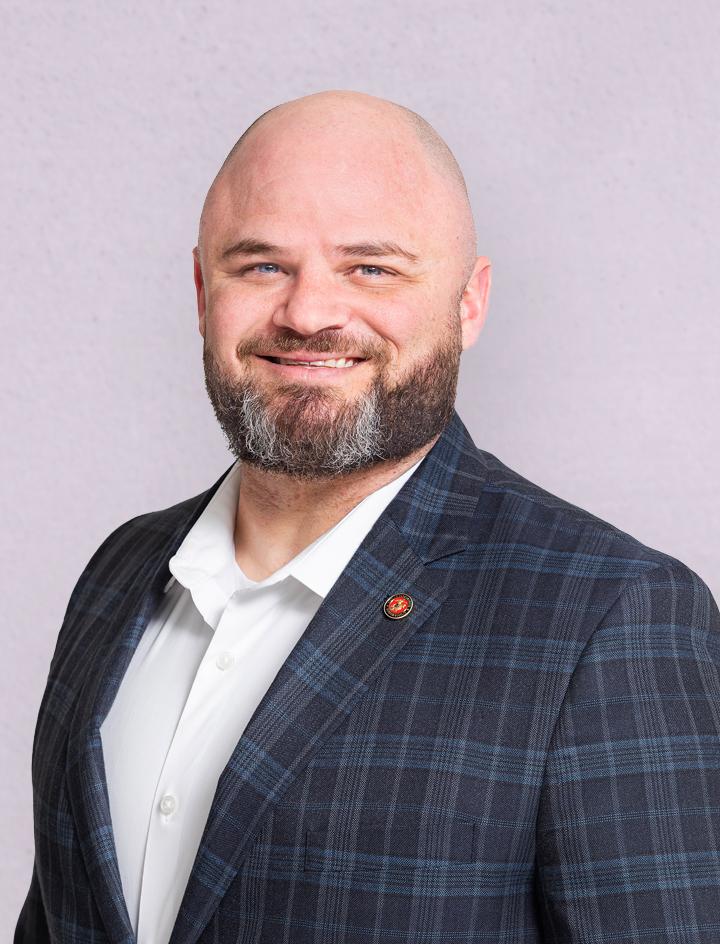FinServe Ambassador Champions the Power of Next-Gen Disruption

As a member of The College’s FinServe Network, co-chair of its Next Gen Advisory Task Force, and host of The College’s former podcast program for next-gen professionals, NextGen in 10, Phillips has been a highly visible and active advocate for The College’s power to change the profession – as well as its responsibilities to nurture and empower the next generation of financial services leaders and innovators.
Breaking Into a Brand-New Field
In her younger years, Phillips confesses she had no idea she’d end up in the financial services industry.
“For a long time, I thought I was going to be a retail store manager or some kind of human resources professional: working in Starbucks HR or running a Target store was the height of my ambition,” she said. “I only ended up jumping into financial services because some changes in my personal life meant I needed a more stable schedule and because managing people and working in retail can be crazy.”
Initially, Phillips was hired as a recruiter for a large financial services company, a position she saw herself as well suited for. But there was an obstacle in her continued lack of knowledge about the industry she found herself in – so she decided to ask for help.
“The first time anyone at the company mentioned annuities, stock, or bonds, I had no idea what they were talking about, but I wanted to learn,” she said. “I started by interviewing the advisors I worked with to get the basics and learn the ropes. A few of them even let me sit in on their client meetings.”
Eventually, Phillips earned several financial services licenses, and her knowledge was further broadened by her professional advancement, moving from recruitment to training and development for new professionals and assisting in buying up new practices to fit them into. While the industry sometimes gets a bad rap for its competitiveness, she says she was highly fortunate in those early years that her coworkers were so open and willing to support her.
“My managers let me experiment early on; they encouraged me to get into things like website development and to get exposure to working with different types of teams at different levels,” she said. “We had some good years together, but eventually my goals and beliefs were no longer aligned with the company; I wanted to be more of an advocate for advisors. That’s when I decided I wanted to go out on my own.”
The Power of Next-Gen Professionals
After over seven years at a major firm, going it alone was intimidating – but Phillips says she was committed to her mission to expanding the opportunities of young professionals in financial services and showing them the possibilities at their fingertips. This led to her to her current role as an educator, recruiter, and guide in helping advisors seeking new options to “break up” with their broker-dealer, as well as getting involved with student and young professional groups. The more she saw from the next-gen individuals she worked with, the more impressed she was.
“A lot of people complain about the laziness and entitlement of the younger generation, but the ones I’ve met are ambitious, intelligent, educated, and know what they want,” she said. “They’re so far ahead in a lot of ways, but they often don’t know how to communicate what they’re looking for appropriately in a professional setting or navigate complex power dynamics. They believe in setting boundaries and working smarter, not harder – the challenge for them is getting their managers and organizations to buy into that worldview.”
In fact, Phillips says, next-gen professionals – especially women and those from diverse communities – represent the future of the financial services industry with their fresh perspectives, creative energy, and innovative ideas.
“There’s so much data now on how diverse teams perform better, especially teams with people of different genders on them,” she said. “If you’re a manager in the business, the idea that you still have to have a business case to justify hiring more women, for example, is absurd. Financial professionals are all about returns on investment, and having young and diverse perspectives is the key to securing them.”
In her work with other next-gen members of the industry, Phillips was introduced to The College by a former faculty member and saw the potential in its message and mission. She joined an early incarnation of its Next Gen Advisory Task Force and took on a growing leadership and advocacy role over the ensuing years, culminating in a reimagining and relaunch of the initiative under the leadership of herself and Lindsey Lewis, MBA, CFP®, ChFC® of The College’s Center for Women in Financial Services. The two continue to collaborate on many projects, including co-hosting representation-themed episodes of The College’s Shares podcast. She says in the future, she hopes to pursue a College education program such as the CFP® Certification Education Program to enhance her knowledge of financial planning further.
“These days, I tend to gravitate toward people and places that align with what I believe, and I believe very strongly in The College’s efforts to empower next-gen professionals,” she said. “Events like the Conference of African American Financial Professionals (CAAFP) and groups like the Center for Women in Financial Services do an amazing job of spreading The College’s message and I love watching them grow.”
Overcoming Barriers to Entry
While the financial services industry has made much progress, Phillips says there are still many challenges to overcome in incorporating more diverse perspectives and people into the profession. Her favorite analogy compares the industry to a piano – an instrument originally created specifically for men’s hands.
“Since men have larger hands than women, any woman who wanted to be a concert pianist would have to either have bigger hands or be willing to injure herself in pursuit of her goal,” she said. “In financial services, all the systems and structures were built around older, whiter men because for a long time that’s who had the money. Mentalities may have shifted over time and women have much more power today, but the piano still hasn’t changed, and neither has financial services. Until we rethink these basic structures and attitudes, we’ll continue to have trouble with female representation in the industry.”
Phillips says the financial services industry needs to try something different – and she sees a lot of potential in the Registered Investment Advisor (RIA) and independent space, where she gets most of her clients. With the advent of new technologies like social media and artificial intelligence (AI), she’s seen many next-gen advisors adopt them to great success.
“We need to amplify their voices so the industry establishment knows these things work,” she said.
As for next-gen professionals themselves and those new to the industry, Phillips says the key to success in the business today is threefold. Advisors need to have an ideal audience for their services in mind and know what they may need help with, whether it be child care and saving for college, starting or exiting a business, insurance coverage, or another niche they can specialize in. Additionally, transparency is of paramount importance as financial professionals need to be as open and honest with their clients and with prospects as possible. Perhaps the most important piece, however, is for advisors to be authentically themselves.
“Some of the stuff I share on social media is goofy, and while some people may choose not to work with me because they think I’m silly, I probably wouldn’t match up well with them anyway,” she said. “By being yourself, you may repel some people, but the ones you’ll attract and keep will form a much higher-quality community and better relationships.”
Phillips says she often encourages professionals to share their personal opinions on social media as part of this strategy.
“Having a strong opinion in public about something can be scary, but fence-sitting is boring and your ideal clients aren’t looking for that,” she said. “You can’t differentiate yourself without opinions, and it makes you stand out from the canned content a lot of other people put out there.”
In all, Phillips says she relishes her role as a champion of disruption in the industry whether it be through a greater role for women, RIAs, next-gen professionals, or other means.
“We need to rethink why we’re doing things the way we are and ask ourselves why we do them,” she said. “If you don’t have an answer or you think there’s a better way, experiment. The best time for growth and evolution is when someone decides to shake up the status quo.”
FinServe Ambassador Champions the Power of Independent Advisors

Along with his wife (Kennah) and two other partners (Warren and Jennifer), Parham runs Innovative Wealth Building (IWB), an RIA firm headquartered in California, MD, but with a reach that spreads across the country. It’s a successful business that operates alongside many of the giants in the financial services industry – a fact that always pushes RIAs to continually seek new ways to grow and scale. The journey between these two worlds is one that Parham himself has navigated.
“When I went to college, I had no idea what I wanted to be when I grew up,” he says. “I was lucky enough to land an internship at Northwestern Mutual when I was 20 and as those summer days just flew by, I realized this was what I wanted to do for the rest of my life.”
After his experience with a large national firm like Northwestern, Parham’s professional career started out a bit smaller as a financial advisor for First Command, a boutique firm mostly serving the military community. He was eventually promoted to district manager and associate director of training, helping to welcome many other new advisors to the field, before deciding to take a leap over to Prudential, one of the largest firms in the industry.
“Working at Prudential really opened my eyes to what was out there,” he says. “At my previous company, I hadn’t gotten much of a chance to experience life outside of the fishbowl. During my time at Prudential, I learned a lot more about the industry and the vastness of the opportunities that I wasn’t even aware of. I also began engaging in more complex planning with high-net-worth clients, something I’d never gotten to do before, and I wanted more of that.”
Independence in Practice
Once his contract with Prudential was up, Parham decided to make another leap: from the corporate world to the field of independent advising. This was the genesis of IWB.
“After almost 10 years in the industry, I knew what I liked and what I didn’t like, and I knew that I could use those ideas combined with my strengths to build a financial planning utopia for my clients,” he says.
“When you’re independent, you can do what you think and know is best for your clients. Instead of having to keep your opinions to yourself and toe the company line, you’re free to chart your own path.”
The transition to independence, as Parham describes it, broke down into three core promises to the clients he worked with: better investment services, better technology, and lower fees. The first two sprung from his newfound freedom as an independent advisor to make the decisions he felt were right for himself and those he served, and the last was made possible by the lack of overhead that larger companies have to factor into their service models. While the process of building the new firm was a multi-year endeavor, he says he noticed the difference right away – as did many of his clients.
“The first sign that we were moving in a good direction was that by the time we had finished transitioning all our clients over to IWB, many of them were already recommending us to other people,” he says. “When we first started, we didn’t even have a website. Now, we get requests through it for new client introductions multiple times a week.”
However, Parham also isn’t shy about the challenges that independence brings – including a massive amount of decision-making that can sometimes be overwhelming.
“When you’re independent, you don’t have a parent company to fall back on. If things aren’t excellent, nobody’s on the hook for that but you,” he says. “It’s a big world with a lot of choices, and if you’re not careful, you can fall victim to decision fatigue. It’s like birthday shopping for a significant other: there are so many options out there, but how do you decide on the best one?”
The Armor of Knowledge
In the midst of all these choices, however, Parham says one thing has helped keep him on course: the education he received from The American College of Financial Services.
“Being an RIA instead of working for a broker-dealer is like swimming in the ocean as opposed to a pool. It can be lonely, and there may even be sharks in the water. Working with The College has shown me there are lots of people out there just like me, and has allowed me to collaborate with others in ways that have proved to be mutually beneficial for all parties.”
Parham says that he was initially self-taught when joining the industry, but began his learning journey with The College through its CFP® Certification Education Program to earn the coveted industry-standard mark. From there, he took advantage of The College’s interconnected programming to branch out to the Chartered Life Underwriter® (CLU®), Chartered Financial Consultant® (ChFC®) and Wealth Management Certified Professional® (WMCP®) designations.
“The College’s education has been like body armor for me,” he says. “The WMCP® especially gave me the knowledge and confidence to work with more up-market clients and higher-net-worth individuals I’d never spoken with before, and I’ll absolutely be a lifelong learner.”
One of Parham’s more recent acquisitions is the Retirement Income Certified Professional® (RICP®) designation, which he says has helped him focus on the critical needs of clients at or nearing retirement, including Society Security claiming, long-term care and longevity risk, asset management, and wealth transfer. However, it’s also given the tools to approach another pool of clients as well–those who may be young, but are already looking to set themselves up for the future.
“A portion of my clients are from the West Coast and the Los Angeles area–people in their 20s and 30s who may be high earners but not rich yet–and many of them don’t know that small steps today can reap big benefits for tomorrow,” he says. “Almost everyone wants to retire, and even people who don’t think they’ll be able to will usually jump at the chance if you show them it’s possible and what to do about it. The difference between having a $900,000 nest egg and having maybe more than $3 million in the bank can sometimes be as simple as a few small adjustments–and that’s the knowledge the RICP® has given me.”
Maintaining RIA Excellence in a Changing World
Building and running an independent practice is a lot of hard work, Parham admits–but when asked if he ever second-guesses his decision, his answer is a definitive no.
“Going RIA has led to an almost unbelievable improvement in my career and in my life,” he says. “If you do it right and prepare for it properly, you’re going to wonder how you lived without it. People ask me if the grass is greener on this side of the fence, and I sometimes tell them that if you go RIA, you might realize you didn’t even have any grass on the other side to begin with.”
Parham compares the business of running an independent practice with the idea of owning a home as opposed to renting one: when renting, you might not have to be as focused on all the things to do, but owning comes with a greater sense of pride along with the responsibility. He does acknowledge, though, that further change and evolution is needed both in the profession and in society.
“The RIA space is probably less diverse than the broker-dealer world, and our industry as a whole isn’t as diverse as many others,” he says. “When you look at the wealth distribution in America and the types of people who generally hold the wealth, you get a sense of why that might be, but it’s not just that; many aspects of the industry just aren’t meant to cater to certain populations who may want to get into it.”
Parham cites paid family leave as one such policy, as many companies in the financial services industry still may not offer it to their employees–especially working mothers.
“We’ve made some progress, but overall financial advising as a profession isn’t set up to accommodate many people’s lives and circumstances. As a result, the financial services industry tends to have a very high rate of attrition. We need to rewrite the rules, and that’s where the RIA space comes in. Here, I can be more flexible and do things that I believe are the best practices to attract and retain diverse talent. I can really be a part of the change.”
How Financial Advisors Can Effectively Leverage AI Tools in Practice

According to surveys from the World Economic Forum and the Cambridge Centre for Alternative Finance, as of late 2023 85% of financial organizations globally were using AI tools in some form, and 52% have already created at least some AI-driven products and services. Additionally, 77% of firms believe generative AI platforms such as ChatGPT, Bard, and Microsoft Copilot will become essential to the industry in the next two years.
While lawmakers, technologists, philosophers, and everyone in between may continue to debate the ramifications of developing AI and potential guardrails that should be placed on new innovations, it’s clear these platforms are not going anywhere and have already become indispensable to many businesses for one simple reason: efficiency. ChatGPT, for example, can scour the entirety of the internet and return comprehensive, conversational answers to queries in a matter of seconds, dramatically faster than a human being could reach the same conclusion. And as one of the industries most directly impacting everyday people and their livelihoods, the financial services profession has found itself at the heart of this technological revolution.
This examination of how financial professionals can use AI effectively and responsibly was the subject of a recent webcast from The American College of Financial Services, held exclusively on its subscription-based learning platform Knowledge Hub+. Eric Ludwig, PhD, CFP®, director of The College’s Retirement Income Certified Professional® (RICP®) Program, and Chet Bennetts, CFP®, ChFC®, CLU®, RICP®, CLF®, director of the Chartered Financial Consultant® (ChFC®) and CFP® Certification Education Programs, hosted the discussion based on their deep experience with testing and using AI systems: specifically, the evolving field of prompt engineering.
“Almost everyone who uses ChatGPT for the first time is blown away–but not always for the right reasons,” Ludwig says. “Its job is to respond and give you answers, but in doing so it’s not immune to ‘hallucinating’ or making up information. The question we’re trying to address is how to get the tool to do what you want it to do, and the answer is making clearer requests.”
"The question we’re trying to address is how to get [AI] to do what you want it to do, and the answer is making clearer requests.”
- Eric Ludwig, PhD, CFP®
Uses of AI in Financial Services
As Ludwig and Bennetts point out, even before the launch of ChatGPT, almost everyone was using AI in their lives in some form or another, whether it be through voice assistants like Siri or recommendations in your Netflix queue. The differences between these algorithm-driven services and something like ChatGPT are functionality, level of interactivity, and real-time updates—something that substantially changes the game.
“Consider this: when Netflix and Facebook were first introduced to the world, it took nearly 10 years for them to become universally adopted and accepted,” Ludwig says. “With ChatGPT, it took only two months. Financial professionals can’t afford to overlook these technologies.”
So, should your financial services practice start using AI in everyday work? Ludwig and Bennetts say the answer largely depends on the kind of work advisors want AI to do for them. As Bennetts explains it, there are three big questions every financial professional looking to leverage AI tools should ask themselves:
- Does it matter if the AI tool’s output is true to your practice?
- Do you or other advisors have the expertise to verify what the AI tool is telling you?
- Are you or your organization willing to take responsibility for inaccuracies that may occur based on AI-generated knowledge?
Depending on the answers to these questions, Bennetts suggests financial professionals think long and hard about how they can use AI to its maximum potential and with minimal risk to themselves and their reputations.
“Time savings from using AI tools depends on what you’re using them for,” he says. “Obviously ChatGPT isn’t going to be able to run a meeting with a client for you. But it can be great for service-level jobs, preparation for client meetings, and portfolio- or proposal-building.”
“Obviously ChatGPT isn’t going to be able to run a meeting with a client for you. But it can be great for service-level jobs, preparation for client meetings, and portfolio- or proposal-building.”
- Chet Bennetts, CFP®, ChFC®, CLU®, RICP®, CLF®
How Advisors Can Use AI Responsibly
While ChatGPT and other AI tools are powerful, Ludwig and Bennetts stress they are not infallible: ChatGPT is notoriously bad at translating written descriptions into visual images, for example, and at times even basic math appears to be difficult for it. For this reason, the thought leaders strongly advise against taking the information AI provides as gospel—at least, not without checking it first.
Bennetts says he recommends financial professionals use AI tools as a starting point for research or drafting, reviewing its output and saving the most salient points for personalization and fact-checking before use. Because of this, he says he’s skeptical AI will ever fully replace human workers.
“We generally find consumers still get their financial advice more from social media than from AI,” he says. “The medical community probably felt the same way when WebMD was first created, but WebMD didn’t stop people from going to their doctor. It’s a supplement, not a substitution.”
"[AI] is a supplement [to professional guidance], not a substitution.”
- Chet Bennetts, CFP®, ChFC®, CLU®, RICP®, CLF®
Ludwig and Bennetts also say advisors using ChatGPT and similar systems shouldn’t be afraid to get specific about what they want and how they want it when using AI: advisors can use the technology to provide output to a multitude of formats, specifications, and voices—as long as they know how to ask the right questions and keep their intended audience in mind.
Want to learn more? You can watch Bennetts and Ludwig’s full conversation, including a live demonstration of how financial professionals can use ChatGPT, as well as their AI 101 course, on Knowledge Hub+, now available exclusively to members of The College’s Professional Recertification Program–and coming soon as an open subscription model!
More From The College:
Get specialized retirement planning knowledge with our RICP® Program.
Get the details of our ChFC® Program.
See our CFP® Certification Education Program.
FinServe Ambassador on Keys to Effective Practice Management and Recruiting

An alumnus of The American College of Financial Services, a member of The College’s FinServe Network, and an executive business consultant at Diversified, LLC in Wayne, Pennsylvania, Rosenzweig’s career in financial services spans over 30 years – and as he doesn’t hesitate to tell people, it hasn’t always been an easy road.
Finding the Financial Services Profession
Growing up in Minnesota and following the traditional path to university education, Rosenzweig says his first diversion was discovering that college just wasn’t for him. Looking for other opportunities, he worked a variety of jobs until he, along with his brother and cousin from New Jersey, opened a “California-style” restaurant in St. Paul, Minnesota. The restaurant was named one of the top new restaurants in St. Paul in their year of opening. That experience taught him his first valuable lesson.
“There’s a few industries that people are very critical of, including food, medical care, and anything involving money,” he says. “From a client perspective, you don’t mess up any outcomes involving those topics. Because of that, there’s no shortage of opportunity in those professions for those who aren’t afraid to seek it out and pursue excellence.”
The beginnings of Rosenzweig’s ventures into financial services included some real estate investing and breaking into the fields of insurance and banking as they began to broaden their array of financial products to customers. “Black Monday,” the severe stock market crash in 1987, further molded his experience, and surviving that lesson crafted a career of working in bank financial services, global investment banking firms and then, finally, beginning and running his own firm for the last 20 years. Along the way, he noticed some common and troubling trends that made him question the assumptions of those around him.
“I became conscious that certain types of investments very popular in financial circles didn’t work well practically,” he says. “In addition, financial firms weren’t always allowing you to work for the benefit of the client. Many firms were trying to be the McDonald’s of financial services: serve as many clients as possible with little regard to the quality of product or service.”
A People-Focused Approach
It was this experience that led Rosenzweig to the conclusion that would drive the rest of his career: financial advisors and their practices must seek to be holistic in nature, encompassing as many potential client needs as possible while still maintaining excellent service and quality care. This switch from serving many clients to serving clients’ needs more effectively took him away from big firms and into the more independent space of registered investment advisors (RIAs), which at the time were still in their infancy. Today, he works with Diversified, LLC, the result of a merger between his independent practice and a larger multistate, Delaware-based company. In many ways, this merger was the fulfilling and meaningful role he’d been searching for.
“We have a very diverse client base: entrepreneurs with pension plans and 401(k)s, high-net-worth clients that have been with me from my banking days, and a large segment of middle-class clients who are fairly new or naïve in regard to investing,” he says. “Through our diligence, honest approach, and hard work, our clients trust us, and although younger advisors may lack perspective gained through experience, I was able to convey my expertise and decades-long insight in their training. It’s very important to get to know the client, their concerns, their goals, and their hesitations because I’d been where they are, understood their points of view, and had the work ethic and desire to give them excellent service. We developed a strong bond that allowed us, in many cases, to work with three generations of client relationships.”
“It’s very important to get to know the client, their concerns, their goals, and their hesitations.”
Rosenzweig says the benefits of the merger have been an increased focus on advisor education for employees, while also becoming big enough to split up responsibilities like planning, running meetings, compliance, and back-office duties, and departmentalize things he used to have to do by himself. He says these days, he’s been able to transition into a more supervisory role as the second generation takes over at the firm.
“I’m mostly there to make sure clients are confident in the direction the firm is going, especially when we’re dealing with their major inheritances,” he says. “My job is less to manage the day-to-day and more to send a unified message to clients, and with where I’m at in life now, that’s quite a relief. I’ve also been able to broaden my reach through consulting, volunteering, seeking to serve on company boards, and getting to know other prominent people in the industry.”
However, it hasn’t all been smooth sailing. Rosenzweig says he’s had issues in the past with some new hires and even longtime employees not working out, and the lesson it’s taught him has been that trust and value alignment are indispensable to a practice running smoothly.
“When you’re interviewing people, you have to make sure they’re honest, hard-working, and above all, trustworthy,” he says. “Some will get burned out too quickly because the business moves so fast and have to leave. Others may try to take your clients and go elsewhere because they feel you or the firm owes them something. A sense of ethics and responsibility is key to a good hire.”
The Importance of Expanded Education
Another aspect that makes advisors and firms stand out from their competition, Rosenzweig says, is education – and that’s where The College and its programs come in.
“The College does a great job with its retirement, tax planning, and insurance knowledge through designations like the Chartered Financial Consultant® (ChFC®) and Chartered Life Underwriter® (CLU®). What I learned gave me the confidence and knowledge to get creative with helping business owners and others in need of succession planning fund their own retirements,” he says. “There are so many nuances to product uses, tax laws, and other considerations, and even if some clients don’t perceive a difference, there’s still a huge shift in the quality of advice you can give.”
“What I learned [at The College] gave me the confidence and knowledge to get creative with helping business owners and others in need of succession planning fund their own retirements.”
Rosenzweig says another element of his life that has made him better and more successful in his career and life at large is his personal passion: a decades-long study of the martial arts earning him multiple black belts in several martial arts disciplines. “The martial arts emphasize the need to become well-rounded through the exercise and training of the mind, body, and spirit. The strengthening of will and the concept of ‘indomitable spirit’ builds patience, resilience, confidence, and moral strength,” he says. “It would be easy to succumb to circumstances, market fears, client pressure, and self-doubt that could cause me to question my strategy and financial plans to the detriment of the financial health of clients without the moral strengthening my martial arts experience has given me.
In addition to building character through the martial arts, Rosenzweig has cultivated a network of friends and classmates about whom he readily declares, “They have my back, as I have theirs.” He has even acquired new business from fellow martial artists, as the bonds they form in their classes go beyond studying, training, and perfecting fighting skills to a more personal level. “The formation of trust and respect for intelligence and acumen motivates fellow students to come to me, and I am happy to provide a second opinion on their plans or thoughts. Often, this has resulted in new clients for our firm over the years,” he says.
Returning to the financial services space, Rosenzweig notes responsibility for training today is much more on individual advisors – and advisors need to live up to their duty to give excellent service.
“Retirement planning is extremely important in this day and age, especially for retiring business owners. In general, advisors should get as much knowledge as it takes to help their clients achieve their goals in new and creative ways,” he says. “Expanding your opportunities isn’t just an option: it should be a moral imperative for all of us in the profession.”
“Expanding your opportunities isn’t just an option: it should be a moral imperative for all of us in the profession.”
AI, Prompt Engineering, and Financial Planning

Our thought leaders present on the intersection of AI and financial planning, including how the science of prompt engineering can empower you with the skills to use AI to its greatest potential in your workplace and on behalf of the clients you serve. College and CFP® CE credit is available!
This webcast is only open to members of The College’s Professional Recertification Program (PRP) and available in Knowledge Hub+. Log into Knowledge Hub+ via your Learning Hub.
Presenters
What is Knowledge Hub+?
Knowledge Hub+ is a just-in-time learning and CE platform developed by The American College of Financial Services exclusively for The College's Professional Recertification Program members that curates the wisdom of leading academics, change-makers and innovators, financial planning experts, and practice management leaders into one easy-to-use learning experience for financial professionals.
Knowledge Hub+ delivers the added value of automated reporting of CE credit to the CFP Board and The College’s records, making it easier for financial professionals to fulfill their thirty-hour CE requirements every two years without administrative headaches.
With exclusive live events and new content added quarterly, there’s always something new to learn with Knowledge Hub+.
How Advisors Handle Their Most Difficult Clients
Independence in Practice: How a Florida Firm Powers Growth with Retirement Knowledge

Led by Cary Stamp, RICP®, CFP®, CDFA™, CAP®, AIF®, AEP®, a multi-time alum of The College’s programs including the RICP® and the Chartered Advisor in Philanthropy® (CAP®) designation, this registered investment advisor (RIA) firm in West Palm Beach, FL, has experienced significant growth – and many of its advisors credit The College’s programs with propelling that growth.
Stamp says he believes so much in the power and value of continuing education and The College’s programs that he requires all new advisors at his firm to enroll in a College program, whether it’s the RICP®, The College’s CFP® Certification Education Program, or others. In addition, professionals at the firm say they believe foundational knowledge is no longer enough to guarantee success in a competitive business: they see The College’s programs as key to expanding their opportunities through focused, advanced, and specialized knowledge on specific areas of planning. This knowledge, in turn, allows them to have deeper client conversations and foster better planning outcomes.
For more on how The College and its programs can provide specialized knowledge for career success, visit our RIA Resource Center.
More From The College:
Get specialized retirement planning knowledge with our RICP® Program.
See our CFP® Certification Education Program.
Gain philanthropic and legacy planning knowledge with our CAP® Program.

